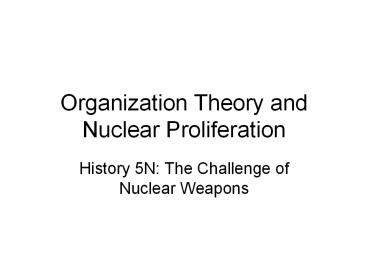Organization Theory and Nuclear Proliferation - PowerPoint PPT Presentation
Title:
Organization Theory and Nuclear Proliferation
Description:
Organization Theory and Nuclear Proliferation History 5N: The Challenge of Nuclear Weapons Assumption of Rationality Government leaders may intend to behave ... – PowerPoint PPT presentation
Number of Views:71
Avg rating:3.0/5.0
Title: Organization Theory and Nuclear Proliferation
1
Organization Theory and Nuclear Proliferation
- History 5N The Challenge of Nuclear Weapons
2
Assumption of Rationality
- Government leaders may intend to behave
rationally, but they are influenced by
organizational actors and constraints - Organizational rationality is bounded
- Organizations use standard operating procedures
and routines - Organizations satisfice
- Organizations siphon information
- Members are heavily influenced by past
experiences - Goal displacement
3
Bureaucratic Politics
- Organizational actors are self interested and
competitive sub-units - Policy sometimes reflects the narrow interests of
individual organizations, not the national
interests of the state
4
Offensive Doctrines
- New proliferators may lack civilian control of
stockpiles - Military organizations have strong proclivities
toward offensive doctrines - See war as an inevitable end the better now
than later logic - Incentive to implement standard scenario
- More likely to support preventive war
5
First Operational Requirement for Deterrence
- First operational requirement for deterrence
the first state to acquire weapons must not
attack its rival in a preventive war now, in
order to avoid the risk of a worse war after the
second state has acquired a large nuclear
arsenal. - Evidence proves that even in the United States
government there was strong support for
preventive war - In the Truman Administration the Joint Chiefs of
Staff (JCS) were in support of first strike
doctrines - In the Eisenhower Administration key military
officers supported preventive options - Other examples
- Russian military leaders considered a preventive
war on China
6
Second Operational Requirement of Deterrence
- The second operational requirement of deterrence
is that both sides have invulnerable
second-strike nuclear forces - The United States gained invulnerable forces only
after civilians forced the production of new
weapons systems - Submarine Launched Ballistic Missiles (SLBMs)
were opposed by US Navy leadership, hoping that
Strategic Air Command would pick up the cost - Intercontinental Ballistic Missles (ICBMs) were
not a priority in the Air Forces budget
7
Third Operational Requirement of Deterrence
- The final operational requirement is that nuclear
arsenals are secure from accidents and
unauthorized use - Unfortunately, organizations change standard
operating procedures after the threat has been
noticed - Evidence from US experience
- Test missile fired from Vandenberg Air Force base
during Cuban Missile Crisis - Staff at a Montana silo gave themselves
independent ability to launch missiles - New proliferants will choose an opaque path to
proliferation, which is even more unstable - Furthermore, new proliferants will not have the
same time security that the US and USSR had
8
Conclusions
- The spread of nuclear weapons will make the world
less secure - Realists such as Kenneth Waltz have confused
what rational states should do with predictions
of real states will do. - Organizational theory yields a troubling outlook
on nuclear proliferations - Three policy implications
- US should maintain its non-proliferation policy
- The international community should be convinced
that non-proliferation is not only in US
interests but for global security - If proliferation does occur, the US should
consider helping organizations develop the safety
mechanisms to help them achieve deterrent
capability and secure systems































